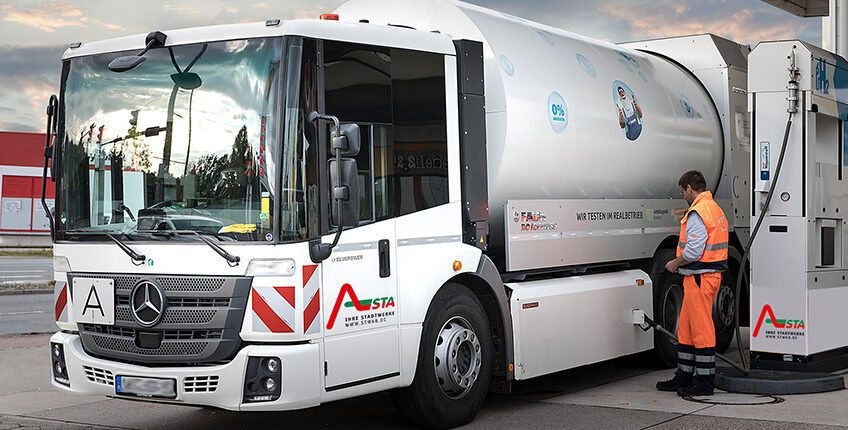The waste management of Aschaffenberg’s municipal utilities focusses on sustainability and emission-free mobility, also for their vehicle fleet. Municipal utilities head Dieter Gerlach has now been presented with a funding notice from the Federal Ministry of Transport and Digital Infrastructure (BMVI) in the amount of around 670,000 euros. Funded under the National Innovation Programme for Hydrogen and Fuel Cell Technology (NIP II), a hydrogen-operated waste management vehicle will be purchased.
The vehicle, expected to be delivered in December 2022, is to be exclusively powered with CO2-neutral hydrogen, generated overwhelmingly from ‘green’ sources. It is planned for the fuel cell waste disposal vehicle to be used in the urban area of Aschaffenburg. It can achieve a range of 100 km on a tank refilling of a maximum of 12 kg of hydrogen. In practice, this means it must be generally refuelled on a daily basis in transport operation at the planned hydrogen refuelling station. Its deployment can save more than 30 tonnes CO2 per year.
Funding enables purchase
The purchase of the fuel cell waste disposal vehicle is possible thanks to the BMVI funding under the National Innovation Programme for Hydrogen and Fuel Cell Technology (NIP II). The funding guideline is coordinated by NOW GmbH and implemented by Project Management Jülich (Projektträger Jülich -PtJ). In all, 90 per cent of additional costs for the climate-neutral vehicle is subsidized by the state. Using alternative types of drives is an important pillar in the implementation of federal government objectives for CO2 reduction in the transport sector.
Sustainable and quiet
Particularly in the area of heavy-duty transport and commercial vehicles, green hydrogen serves as a climate-friendly alternative to using fossil energy sources such as oil and natural gas. “We are gradually converting our vehicle fleets to alternative, CO2-neutral drives. It is important to test the various drives in the various fields of application so that we use the right drive for the right application”, says Dieter Gerlach. Aschaffenberg’s waste disposal already has two e-vehicles for waste paper collection, a waste collection vehicle will be electrically converted by April 2022, with another one foreseen half a year later.
The advantage of the fuel cell vehicles compared to electric vehicles is that hydrogen, like petrol or diesel, can be refuelled in a short time, without having to carry the big, heavy batteries around in the vehicle. In addition, only rolling noise and no engine noise is generated – a positive additional benefit, especially for residential areas.


